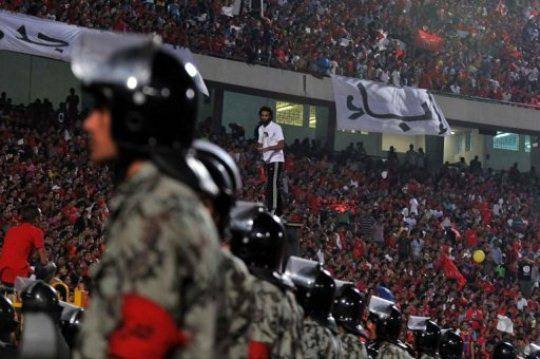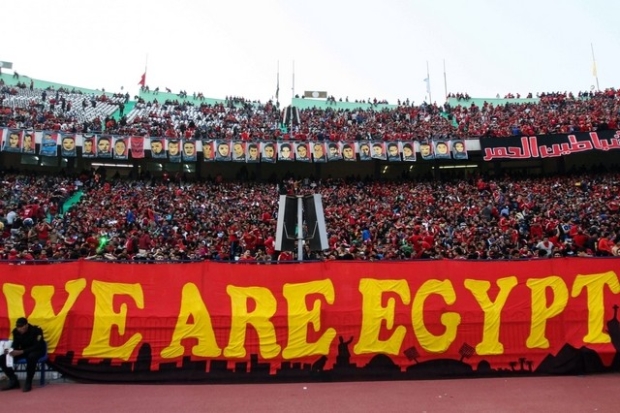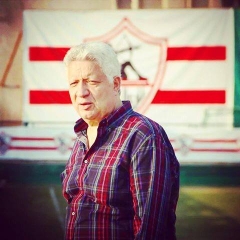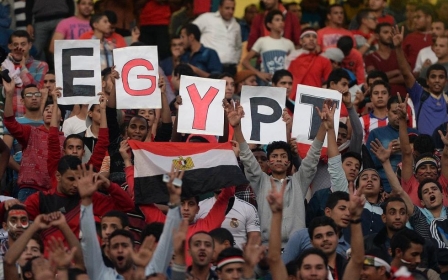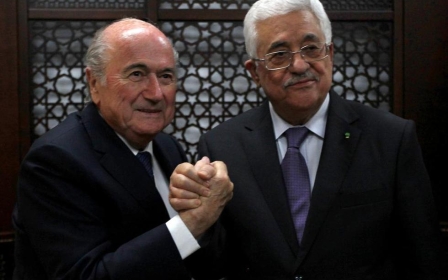Banning fandom: Football and revolution in Egypt
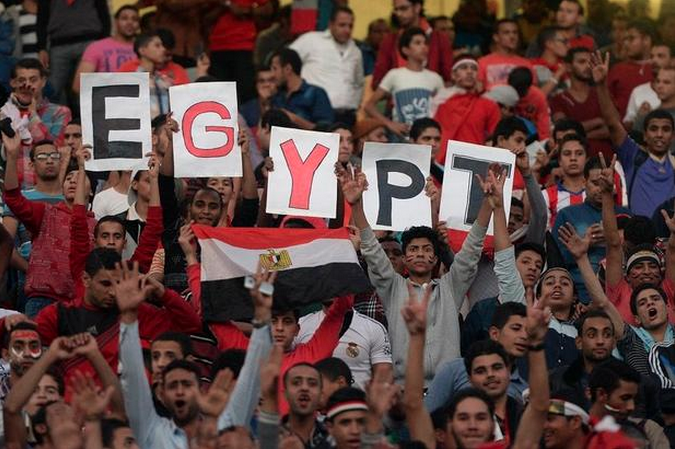
On 16 May 2015, Cairo’s Court of Urgent Matters ordered the dismantling of the Ultras, the countrywide network of groups of devoted soccer fans. The court banned all their activities, inside and outside the football stadiums, accusing them of complicity in past violence and riots. Egyptian newspapers and international media outlets rushed to report that the Ultras groups were not only banned, but also declared a “terrorist” organisation.
Despite this, Tarek Awady, the lawyer representing the group, whose full name is Ultras White Knights, clarified: “There is no court decision categorising [the Ultras] as a terrorist group.” Rather, “the court banned all the Ultras groups in Egypt and their activities, ordering the seizure of the locations where they meet and of their funds”.
The concept of the Ultras was born in Cairo in 2007. They were young football fans fervently devoted to the Cairo-based al-Ahly and Zamalek football clubs. They formed small Ultras chapters across Cairo and, later, the rest of the country, with a basic hierarchy in place. High-ranking Ultras organised the production of banners for the stadium and practices for their chants, as well as basic choreography. They would record their chants with high-grade audio equipment and release seasonal videos and CDs of the year’s highlights. They sold these recordings, along with team gear, to fund trips within the country and sometimes abroad.
Reclaiming football as a public space
Football gave these disenfranchised young people a sense of shared identity, and stadiums became one of the few places where they could meet under Mubarak’s regime. “It was the Ultras who revived the fact that people should watch the game from the stadium,” said Dalia Abdelhamid, a human rights researcher who studied the Ultras Ahlawy group, for die-hard supporters of al-Ahly club. “The Ultras revitalised [the stadiums] and claimed [them] as a public space. They affirmed their right to go there and watch the game [and] to participate actively in it by their performances and chants.” But the stadiums also soon became a place for dissent to erupt, leading to several confrontations between the fans and security forces.
“The sense of community that the Ultras share lies in the passion for the sport, the passion for the club and the hatred towards police forces,” explained Professor James Dorsey of the Nanyang Technological University of Singapore, another researcher who studies the Ultras.
In the years since their inception, the Ultras’ involvement in the 2011 revolution, the splintering of the groups along political lines and their public feud with the highly influential chairman of the Zamalek club, Mortada Mansour, have all shifted their public image.
The court verdict was the result of a private lawsuit presented by the infamous Mansour himself. Mansour, a diehard supporter of Mubarak’s former government who is well known for his bizarre television appearances, has long accused the Ultras of being a "terrorist" organisation as well as of attempting to kill him. In September 2014, in response to his continuous attacks against them, a group of Zamalek Ultras doused Mansour with a bag of urine. “It was a triumph for [the Ultras], because they could have gone to a court or issued a press release to attack Mortada Mansour. Instead, they were mocking him using chants and these methods that he wouldn’t understand,” said Abdelhamid.
'Agents of chaos'
The Court of Urgent Matters, an administrative court that rules only on temporary measures but that has a long record of politically-charged verdicts, rejected four previous lawsuits presented by Mortada Mansour because the court itself admitted that it had no jurisdiction on the issue. On 16 May, however, it decided to accept the fifth lawsuit, and the court issued its verdict against the Ultras.
The verdict never explicitly states that the Ultras are legally defined as a "terrorist" organisation. The misunderstanding seemingly occurred when Ashraf Farahat, the prosecutor in the case and the same lawyer who in April 2014 pushed for the 6th of April Movement to be declared a "terrorist" entity, said that Ultras should now be considered a “terrorist organisation”.
In an interview with Daily News Egypt, Farahat said: “They will not be able to act in the name of those groups during football matches, nor will they have any voice in the face of the regime, and any person acting in their name should be arrested.”
The Egyptian media spread his comments to a population that had already largely come to believe that the Ultras were not “the heroes of the revolution” any more, but “agents of chaos determined to bring down the state and its institutions”, as Ahmed Samir, a 57-year-old man from the working class Cairo district of Sayeda Zeinab, told Middle East Eye. He added: “They are an extremist political movement set to destroy the state. But, no, they are not terrorists.”
“[The Muslim Brotherhood] used the clubs and the youth centres to make an approach to the youth, to use them in their actions in the country,” said Azmy Megahed, the spokesperson for the Egyptian football association, “Still today, they are using the community of Ultras to make these kinds of messes all over Egypt. This decision to consider them as terrorists was very good. The government has been very patient with them, until today.”
According to Megahed, President Abdel Fattah al-Sisi had reached out to the Ultras groups “to use them and direct their power for the benefit of the country, [instead of] letting them destroy the country. We didn’t succeed. The country, the police, and the army know very well that there is a kind of payment these groups are receiving. And also [their backers] are pushing them against the Egyptian army and the Egyptian police.”
Despite their involvement in the street battles of the 2011 revolution, the two biggest Ultras groups, the White Knights (which supports Zamalek) and Ahlawy (which backs al-Ahly), refuse to take a political stance. On the eve of the first democratic presidential elections in May 2012, the Ultras decided to remain neutral and to not support any candidate. “It’s a very complicated thing. They are not for protesting, they are supporting their clubs. They never saw themselves as protestors or fighters,” said Abdelhamid.
The policy of political neutrality adopted by the Ultras led to the formation of occasional splinter groups which were based on the same model but were politically active. The original Ultras, however, stayed loyal to their football-first mentality.
Under Morsi’s government, so-called “Black Blocs” group briefly appeared both online and at clashes between Islamist and secular groups. Although their name and image was clearly borrowed from European anarchist “black bloc” groups, their core membership was made up of anti-Morsi youth who had left the Ultras in a disagreement over their political disengagement. Similarly, after the ousting of President Mohamed Morsi and the banning of the Muslim Brotherhood, groups like the Ultras Nahdawy and others have emerged to support the pro-Morsi legitimacy claim and an anti-Sisi stance.
'The Ultras is a mentality'
The chairman of Zamalek Football Club has never been fond of the Ultras. Mansour, a keen backer of Mubarak's former government, has been accused of taking part in organising the “Battle of the Camels”, when men riding camels and horses and pro-Mubarak protesters attacked demonstrators in Tahrir Square in February 2011. Last year, he briefly considered running in the presidential elections before throwing his support behind now-President Abdel Fattah al-Sisi.
Mansour has consistently attacked the Ultras, accusing them of being everything from “terrorists” to paid thugs, and has repeatedly made thinly-veiled threats against them, as he did on the eve of the Air Defence Stadium massacre, when at least 20 Zamalek fans died in a stampede. The Ultras have in turn publicly denounced Mansour, chanting against him during matches. Their position, however, seems to stem from disagreements about the club’s management and other football-related issues, rather than political ones.
Recently, the Egyptian government has designated several political organisations that were directly involved in the unrest of the last three years as “terrorist” groups. Both the Muslim Brotherhood and the 6th of April Movement - a secular group who led the 25 January revolution - appear on the list of “terrorist entities”. They feature alongside the Islamic State-linked Sinai Province and the other lesser insurgent groups, which have killed scores in checkpoint attacks and bombings. In state media, journalists and witnesses of police brutality are often dubbed “terrorists” as well.
Unlike the Muslim Brotherhood, however, the Ultras do not have financial assets to confiscate or a formal membership. The various Ultras groups have tenuous ties to each other, and becoming an Ultra does not require an initiation process. “The status of Ultras is very vague,” said Abdelhamid. “There are layers of identity and of belonging to the group. Someone may consider himself an Ultra, but not be considered as such by the rest of the group.” It is a highly organised and hierarchical organisation, and at the same time a very loose one with no formal existence.
“The Ultras is a mentality,” explains Abdelhamid. “You can be an Ultra if you go to each match and you support the team and dedicate yourself and your efforts to supporting the team and cheering: this is the mentality of the Ultras. It’s a very complicated thing.” The court’s decision to ban those groups cannot be practically applied, the group's lawyer says, as they “have no official status nor funds. They meet in cafés. They do not have a formal membership,” explains Tarek Awady.
Moreover, the verdict will apply only inside the stadiums. “[The court] got what they wanted to reach. They want to let the spectators back to the stadium without allowing the Ultras back. This verdict could be used as justification for abuses against the Ultras: anybody who’s wearing the Ultras T-shirt or holding the banner could be arrested,” said Abdelhamid.
“We don’t know how crazy this government is. [We could see them] arresting a 14-year-old guy wearing an Ultras T-shirt, if they wanted to. But I don’t think they would need any excuse or justification for doing so, because they’ve been doing [such things] for so long, whether [those targeted] are Muslim Brotherhood or not, and with complete impunity.”
Standing next to the Nile in Giza, just north of Cairo, MEE meets Ahmed Said, a young part-time taxi driver and die-hard Zamalek fan. More interested in listening to radio commentary of one of their matches blasting from his car radio than looking for customers, Said says he is an Ultra in spirit but not in bureaucracy.
“I am an Ultra because I love my team,” he says. “But I am not involved in the organisation, so at the same time I am not an Ultra.”
Asked what he thinks about the verdict, he laughs. “If the Ultras are terrorists, then what are those who place bombs? The Ultras are not about politics; they are about football. They have clashed with the police in the past, because the regime always fought them and abused them.” Said stops to listen to the game, then continues. “Everyone who has raised his head against the regime is now called a terrorist. According to the government, we are surrounded by terrorists.”
He looks around, adding: “If that was really the case, wouldn’t we be having an all-out war in the streets? It’s the government that is waging a war against the revolution and all its symbols.”
New MEE newsletter: Jerusalem Dispatch
Sign up to get the latest insights and analysis on Israel-Palestine, alongside Turkey Unpacked and other MEE newsletters
Middle East Eye delivers independent and unrivalled coverage and analysis of the Middle East, North Africa and beyond. To learn more about republishing this content and the associated fees, please fill out this form. More about MEE can be found here.


